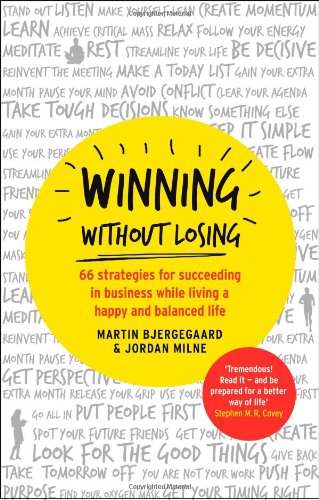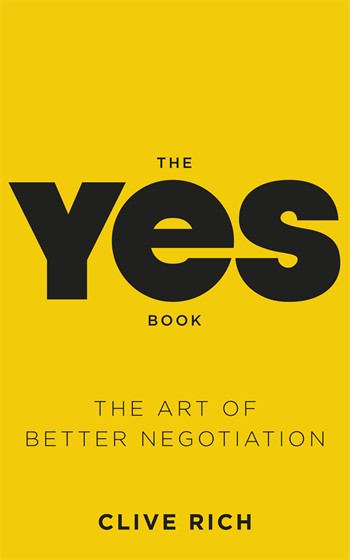It is written by Martin Bjergegaard and Jordan Milne, and is essentially a guide to combining excellence as an entrepreneur with a happy and fulfilled lifestyle. They have noticed that both successful and unsuccessful entrepreneurs frequently accompany their efforts with lack of attention to family, friends, health and some of the simple pleasures that make us happy, including having positive relationships and feeling good physically and mentally. This is ironic given that many entrepreneurs set out on their journey believing that success in their business will liberate them and give them the freedom to live a happy and fulfilled life. Martin and Jordan have created a book all about what they call the “New Dual Optimum”, with 66 tips for balancing entrepreneurial success and personal fulfilment. They show that greater effort at work at the expense of the things that make us happy in fact triggers the law of diminishing marginal returns – delivering less success, not more.
Martin and Jordan are both entrepreneurs so they speak from experience. They run a successful incubator, “Rainmaking”, which in six years has achieved 3 successful exits, and created 8 start ups with revenues of US 50 million and 100 employees. They have also canvassed the views of many other successful entrepreneurs who live out the balance they advocate in their daily lives.
Their sixty six tips are organised into seven sections with essays to support each tip. Here are some examples from each section;
- Efficiency boosters: Examples here include a number of collaborative initiatives such as gathering a team of great co-founders, and spending enough time with your team. It also includes tips to boost your well-being such as meditating for at least 12 minutes every day, and making sure you are fully rested – research shows that sleep deprivation is a leading source of inefficiency.
- Find new ways of doing old things: For example holding meetings whilst doing something else beneficial and balanced such as walking, biking or running; or limiting your “to do” list to just a limited number of tasks for “today” and then, when you have completed those tasks, taking the rest of the day off.
- Avoiding time and energy wasting: Tips here include taking tough decisions quickly rather than prevaricating, not being a slave to your emails and avoiding unnecessary conflicts – US entrepreneurs spent US$152 billion on litigation in 2011!
- Tactics for when the road is rough: Suggestions in this section are about the right attitude for dealing with tough situations. We all face them – it’s how you approach them that counts, so remember when times are tough it’s all about persevering with the right options and making many attempts to get things right; and that every set back is a new opportunity to learn something.
- Planning for Balance: Divide each day into 3 eight hour sections – one third for sleeping, one third for working and one third for doing things that you enjoy – think of all that time you can now devote to doing things that make you happier! Live somewhere that excites you and always have access to fresh air.
- Having the right mind-set – one dedicated to balance: Notice and appreciate everything that goes well in a given day; make sure your team has time for balance too; create your sense of self-worth from more than just your work.
- Taking Action: This section helps you implement all those good resolutions. For example starting tomorrow by doing something that has been hanging over your head all week, or spending two hours thinking about the purpose in your life, or writing down and trying to limit all the things you do that waste time without adding to your performance or happiness.
- There are tips about listening intently to honestly understand the other’s perspective – this is a key behaviour for any good negotiator.
- The importance of inserting mind-freeing moments throughout your day – this is true of negotiation too, where taking a break is always beneficial in terms of creating solutions.
- Avoiding people who drain your energy is also advocated – too right, we all spend too much time negotiating with “users” who are only want to take from us.
- Dealing with conflicts in person is also recommended. This applies to negotiation too. Hiding behind snippy emails is no way to get deals and problems resolved.
- Above all the notion that “winning without losing” is possible is a characteristic that all positive and effective negotiators share – they always think it’s possible to get the best from any negotiating situation.
This is a really helpful and positive book for all those in the business of building their own business. It shows that however all-consuming that endeavour may be, paradoxically less is more. The more balance you have, the more you focus on other things as well as work, the more successful you will be.

One thing that particularly struck me as a professional negotiator was how useful many of the tips are when you are negotiating. Perhaps this is not surprising given that good negotiation is also about achieving a balance rather than crushing the other party. For example:
So, hats off to Martin and Jordan for producing a highly readable and helpful guide to successful entrepreneurship – which may also make followers better at negotiating too…


[…] and author of The Yes Book: The Art of Better Negotiation, Clive Rich, has written a fantastic review on Winning Without […]